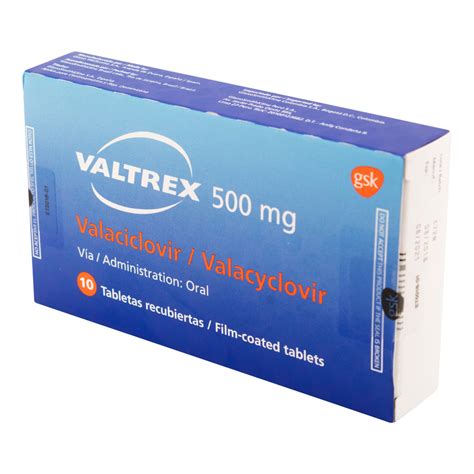Valtrex, also known by its generic name valacyclovir, is an antiviral medication used to treat various viral infections, primarily those caused by the herpes simplex virus (HSV) and varicella-zoster virus (VZV). The medication belongs to a class of drugs known as nucleoside analogs, which work by inhibiting the replication of viral DNA, thereby reducing the severity and duration of viral infections.
Valtrex is most commonly prescribed for the treatment of genital herpes, a sexually transmitted infection caused by the herpes simplex virus type 2 (HSV-2), as well as for the treatment of cold sores, which are caused by the herpes simplex virus type 1 (HSV-1). Additionally, it is used to treat herpes zoster, also known as shingles, which is caused by the reactivation of the varicella-zoster virus that initially causes chickenpox.
How Valtrex Works
Valacyclovir is a prodrug, meaning it is converted into its active form, acyclovir, in the body. Acyclovir then acts by selectively inhibiting the viral DNA synthesis and replication. This action is highly specific to viral cells and does not significantly affect the host cells, making it an effective treatment with minimal side effects compared to other antiviral drugs.
The mechanism of action involves the following steps: 1. Conversion to Acyclovir: Valacyclovir is converted into acyclovir by the enzyme valacyclovir hydrolase. 2. Phosphorylation: Acyclovir is then phosphorylated into its active form, acyclovir triphosphate, by viral and cellular enzymes. 3. Inhibition of Viral DNA Synthesis: Acyclovir triphosphate competes with the natural nucleosides for incorporation into the growing viral DNA chain, leading to the termination of DNA synthesis. 4. Prevention of Viral Replication: By inhibiting viral DNA synthesis, acyclovir effectively prevents the replication of the virus, reducing the viral load and alleviating symptoms.
Uses of Valtrex
- Genital Herpes: For the treatment of initial and recurrent episodes of genital herpes in immunocompetent adults.
- Cold Sores: For the treatment of cold sores (herpes labialis) in adults and children 12 years of age and older.
- Shingles: For the treatment of herpes zoster (shingles) in immunocompetent adults.
- Chickenpox: For the treatment of chickenpox in pediatric patients 2 to less than 18 years of age.
Administration and Dosage
Valtrex is administered orally in the form of tablets, and the dosage varies based on the condition being treated. For example, for the treatment of genital herpes, the typical dosage is 500 mg or 1 gram twice daily for a certain duration, which can be adjusted based on the severity of the outbreak and the patient’s immune status.
Side Effects and Precautions
While generally well-tolerated, Valtrex can cause side effects such as nausea, vomiting, diarrhea, and headache in some patients. It is essential to stay hydrated while taking Valtrex, as it may increase the risk of kidney stones in some individuals. Patients with renal impairment may require dose adjustments.
Valtrex is not a cure for viral infections but significantly reduces the symptoms, severity, and frequency of outbreaks. It is crucial to follow the prescribed dosage and treatment duration to achieve optimal results.
Conclusion
Valtrex is an effective antiviral medication for managing and treating viral infections caused by the herpes simplex virus and varicella-zoster virus. Its ability to reduce the severity and frequency of outbreaks makes it a valuable treatment option for individuals suffering from these conditions. However, it is essential to use Valtrex under the guidance of a healthcare provider and to adhere to the prescribed treatment regimen to maximize its benefits while minimizing potential side effects.
What is the primary use of Valtrex?
+Valtrex is primarily used to treat infections caused by the herpes viruses, including genital herpes, cold sores, and shingles.
How does Valtrex work?
+Valtrex works by inhibiting the viral DNA synthesis and replication, thereby reducing the severity and duration of viral infections.
What are the common side effects of Valtrex?
+Common side effects of Valtrex include nausea, vomiting, diarrhea, and headache. Patients should also be aware of the potential for kidney stones and stay well-hydrated.
In conclusion, Valtrex offers a significant advancement in the management of viral infections, providing relief and reducing the severity of symptoms for millions of people worldwide. Its efficacy, combined with a relatively favorable side effect profile, makes it a preferred treatment option for many healthcare providers and patients alike.



